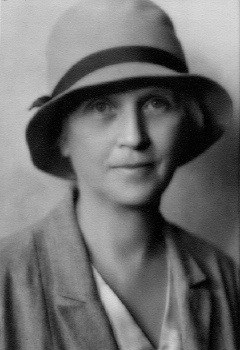Related Research Articles
The American Folklore Society (AFS) is the United States (US)-based professional association for folklorists, with members from the US, Canada, and around the world, which aims to encourage research, aid in disseminating that research, promote the responsible application of that research, publish various forms of publications, advocate for the continued study and teaching of folklore, etc. The Society is based at Indiana University and has an annual meeting every October. The Society's quarterly publication is the Journal of American Folklore. The current president is Marilyn White.
William R. Bascom was an award-winning American folklorist, anthropologist, and museum director. He was a specialist in the art and culture of West Africa and the African Diaspora, especially the Yoruba of Nigeria.

Martha Warren Beckwith was an American folklorist and ethnographer who was the first chair in folklore at any university or college in the U.S.
Joseph Médard Carrière (1902–1970), was an award-winning Franco-Ontarian French-language scholar. He was most noted as a collector of French folklore from the Midwest of the United States.
Írgalach mac Conaing Cuirre, also called Írgalach ua Conaing, was a King of Brega from the Uí Chonaing sept of Cnogba (Knowth) of the Síl nÁedo Sláine branch of the southern Ui Neill. He was the son of Conaing Cuirre mac Congaile and brother of Congalach mac Conaing Cuirre, previous kings of Brega. He ruled from 696 to 702.
Kenneth S. Goldstein was an American folklorist, educator and record producer and a "prime mover" in the American Folk Music Revival.
Donald Knight Wilgus was an American folk song scholar and academic, most recognized for chronicling 'Hillbilly', blues music and Irish-American song and his contribution to ballad scholarship.
Prof Harold William ("Tommy") Thompson FRSE FSA DLitt (1891–1964) was an American folklorist and historian. He was also a competent musician, specialising in playing the organ.
Ellen Stekert is an American academic, folklorist and musician. Stekert is a Professor Emerita of English at the University of Minnesota.
Anna "Anta" Birgitta Rooth was the first Swedish professor of ethnology at Uppsala University. She is known for her research into folklore, especially the Cinderella story.
Anna Hardwick Gayton (1899-1977) was an American anthropologist, folklorist and museum curator. She is most recognized for her role in "compiling and analyzing Californian Indian mythology" and was elected President of the American Folklore Society in 1950.
Sylvia Ann Grider is an American folklorist, noted for her research into such topics as ghosts, child lore and the memorialization of tragic events.
Elaine J Lawless is an American folklorist. She is Curators' Professor Emerita of English and Folklore Studies at the University of Missouri. In 2008 she was elected president of the American Folklore Society.
Michael Owen Jones is an American Folklorist and Emeritus Professor in the World Arts and Cultures/Dance Program at University of California, Los Angeles (UCLA).

Jane C. Beck is an American folklorist and oral historian. She is Executive Director Emeritus and founder of the Vermont Folklife Center and has published research on the folklore of Vermont and on African American belief systems.
Michael Ann Williams is an American Folklorist, recognised for her research into vernacular architecture, particularly in Appalachia.
John W. Roberts is an academic who specialises in Folklore, African-American Studies and English Literature. His work has argued for the "integrity, authenticity, and authority" of African-American vernacular traditions.
C. Kurt Dewhurst is an American curator and folklorist. Dewhurst is Director for Arts and Cultural Partnerships at Michigan State University (MSU) and also a Senior Fellow in University Outreach and Engagement. At MSU, he is also Director Emeritus of the Michigan State University Museum and a Professor of English and Museum Studies.
MacEdward Leach (1892-1967) was an American folklorist, whose work "greatly influenced the development of folklore as an academic discipline".

Emelyn Elizabeth Gardner was an American folklorist, educator, and English professor. Gardner was co-founder with Thelma G. James of the Wayne State University Folklore Archive, one of the oldest and largest collections of urban folklore in the United States. Gardner's 1937 book Folklore from the Schoharie Hills is considered to have been groundbreaking.
References
- ↑ "Prof Emerita". American University. Retrieved 2022-04-09.
- ↑ Radner, Joan Newlon (1971). Fragmentary annals of Ireland from MS 5301-5320, Bibliothèque royale de Belgique, Brussels (Thesis). OCLC 57632198.
- ↑ "Jo Radner - A Maine Humanities speaker". Maine Humanities Council. Retrieved 2022-05-15.
- ↑ "Jo Radner's BURNT INTO MEMORY". Mayo Street Arts. 2022-01-06. Retrieved 2022-04-10.
- ↑ Yocom, Margaret R. (2010). Radner, Jo (ed.). "Jo Radner's "Burnt Into Memory"". Storytelling, Self, Society. 6 (3): 241–244. ISSN 1550-5340. JSTOR 41949137.
- ↑ "University of Illinois Press, 'Feminist Messages: Coding in Women's Folk Culture'". www.press.uillinois.edu. Retrieved 2022-04-10.
- ↑ "Past AFS Presidents". The American Folklore Society. Retrieved 2022-04-09.
- ↑ Radner, Joan N. (2001). "AFS Now and Tomorrow: The View from the Stepladder (AFS Presidential Address, 28 October 2000)". The Journal of American Folklore. 114 (453): 263–276. doi:10.2307/542023. ISSN 0021-8715. JSTOR 542023.
- ↑ Radner, Jo (2008-01-01). "On the Threshold of Power: The Storytelling Movement Today". Storytelling, Self, Society. 4 (1). ISSN 1550-5340.
- ↑ "Jo Radner - Yankee Ingenuity: Stories of Headstrong and Resourceful People". www.joradner.com. Retrieved 2022-04-10.
- ↑ "2013 Storytelling World Resource Awards". storytellingworld.com. Retrieved 2022-04-09.
- ↑ "Brother Blue and Ruth Hill Award". Northeast Storytelling. 2017-09-28. Retrieved 2022-04-09.
- ↑ "2017 AFS Honor, Prize, and Award Recipients". The American Folklore Society. Retrieved 2022-04-10.